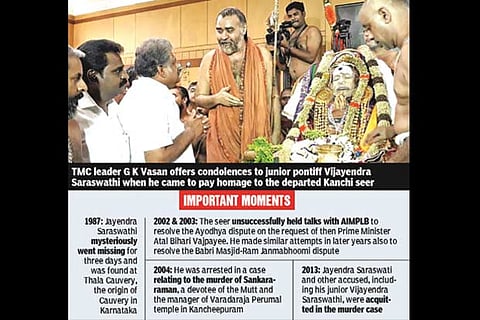

Tamil
Jayendra Saraswathi had made a vain bid to resolve the vexatious Ayodhya temple issue by mediating in 2002.
Anointed the 69th pontiff of the mutt in 1994 succeeding Sri Chandrasekharendra Saraswathi Swamigal, he was considered a transformative force who reached out to all sections of people, including Dalits, and undertook social service.
He also strived to reach out to the underprivileged sections of the society and founded two outfits -- ‘Jan Kalyan’ and ‘Jan Jaghran’ -- with the objective of carrying out service-oriented activities.
The bodies supported renovation of temples in Dalit neighbourhoods besides setting up new ones. The mutt, under his charge, focused on welfare assistance for the destitute women and free tuition for underprivileged students. He was instrumental in establishing a string of (Sankara) schools under the aegis of Sankara Educational Trust.
A deemed university for ayurveda was also being run by the mutt, VRV Ramanujan, closely associated with ‘Jan Kalyan’ movement, said.
TG Ganesan, a spiritual activist associated with the mutt, said, “He (Jayendrar) was the first pontiff from Kanchi mutt to make it a regular practice to meet the common people, especially Dalits in their dwellings.”
“In 1982, when a section of people decided to quit Hinduism and embrace another religion in (Meenakshipuram) Tirunelveli district, the pontiff reached out to them and took conciliatory efforts to settle the caste related issues and promote peace,” he said.
He also established hospitals, including in Assam (Shanakara Devanetralaya) and Andhra Pradesh. In, Meghalaya and Andaman & Nicobar islands the mutt was engaged in community service currently.
An ‘Aagamapaadasala’ (school for grooming priests) in Sirkazhi and a ‘Tamil paadasala’ in Chetpet, Chennai, were established, mutt manager Sundaresa Iyer said. Prayer services for the sick were organised through ‘Hindu Samayamandram,’ he added.
On the historical significance of the mutt, historian and Archaeologist S Ramachandran said, inscriptions relating to the pontiff of the mutt dating back to 14th century AD were found in the Kamakshi temple in Kancheepuram and Lord Siva temple in Vandavasi.
Visit news.dtnext.in to explore our interactive epaper!
Download the DT Next app for more exciting features!
Click here for iOS
Click here for Android